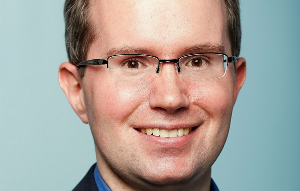When recruiting IT talent, Dr. David Bray, senior executive and CIO of the U.S. Federal Communication Commission, certainly looks for a strong technical background and a change agent mentality in candidates; however, one quality that particularly piques his interest is an educational background in biology or anthropology.
Why? Bray, who himself has a background in computer science and biology, explains, “In physics, you can write out an equation. In chemistry you can write out chemical formulas. By comparison, in biology, you’re really thinking about ecosystems and behaviors at-scale across large populations. You’re thinking about how things evolve and change over time. You're thinking about complex adaptive systems, and that mindset isn't taught in a formal engineering or a formal computer science program.”
“In addition, people with anthropology backgrounds are really good at listening to the needs of stakeholders, documenting them, and understanding, at the end of the day, this is a human using the technology,” Bray adds.
We caught up with Bray to learn more about why he thinks other CIOs and other digital C-suite leaders should consider bringing these skills into their organizations.

The Enterprisers Project (TEP): Is a background in biology and anthropology just a nice perk, or do you believe engineers and computer scientists who are already out in the workforce need to proactively expand their skills in these areas?
 Bray: Over the next three years, I think we are going to see a rapid convergence in the area of bioinformatics, or making sense of data – whether it be genetic data, population data, health data, etc. – and the IT necessary to support that biological data. Both ecosystem-level thinking and anthropology-level thinking will be critical for this. Similarly, if your organization is going to pioneer the use of automated systems and artificial intelligence, being able to think about behaviors at-scale across large populations will be essential.
Bray: Over the next three years, I think we are going to see a rapid convergence in the area of bioinformatics, or making sense of data – whether it be genetic data, population data, health data, etc. – and the IT necessary to support that biological data. Both ecosystem-level thinking and anthropology-level thinking will be critical for this. Similarly, if your organization is going to pioneer the use of automated systems and artificial intelligence, being able to think about behaviors at-scale across large populations will be essential.
For all engineers, I would recommend they start reading about biology – it will expose a new way of thinking that is more probabilistic versus deterministic. Ecosystems represent complex adaptive systems where you can modify the initial starting conditions and the rules present in the system, however, you cannot directly influence the same exact outcome every time.
Engineers reading about biology can apply their new insights to learning how to indirectly influence things versus directly influence things, and that will be key to both developing their skills as a technologist and more importantly as a leader. Folks willing to do both IT and biology can also get familiar with the different protocols used by bioinformatics, like BLAST (Basic Local Alignment Search Tool), that can help them think about how to visualize genetic data, healthcare data, population-level data, in a way that makes sense.
TEP: How do you make sure these types of skills and mindsets are being put into action within your organization?
Bray: I’ll give you an example. In 2004, I took on a role of associate director of informatics for the Centers for Disease Control’s Division of HIV/AIDS Prevention and had a team of about 120 people spanning 10 different branches. These 10 branches were not used to working together. I assigned business analysts to each of the different branches with the sole purpose of understanding their IT needs and top priorities. When I was looking to recruit these business analysts, I was particularly interested in one person who had a background in anthropology. As an anthropologist, she was good at understanding the cultures, stories, and narratives present in an organization, and I believed she would be able to draw out how they were using the technology tools they had and the future tools they would need.
I ended up assigning her to one of the more challenging branches, and the branch chief came running to me and saying, “I don’t want this. I want an epidemiologist. I want a public health professional.” I held firm. I explained that we needed to understand what his branch was doing and their focus areas, and that this person would be the liaison between what they were doing and what IT could do to support that.
The branch fought me, tooth and nail, over my approach of having a business analyst working alongside them in their branch to understand their informatics needs. In fact, they ended up doing what’s called a Freedom Of Information Act (FOIA) request on my resume to see if I was even qualified for my job. The informatics team I led experienced active resistance for about a year. Yet over time the resistance abetted and, a year-and-a-half in, that branch chief came back and said, “Having that person was the best thing that ever happened to us.”
TEP: That's incredible. Why do you think it ended up being such a success?
Bray: Each of the branches, by having a business analyst that could learn their culture, was able to link their needs to technology ventures and prioritize what they wanted to pursue first. Each branch was able to gain a better understanding of how they were using the tools. This is important because at the end of the day, technology is tool use – and the tool itself is an extension of what humans can do individually and in teams.
In today’s era, great C-suite leaders need to think about what work and behaviors they want across an organization. This is why I stress it’s essential to “seek to understand, before you seek to be understood” as a leader. Change agents are influencing digital ecosystems both within their individual organization, as well as the larger internet connect. This is why I think pairing biology and IT backgrounds will be key for the future.
For both the up-and-coming generation of technology talent as well as existing talent in the workforce, if you are able to demonstrate that you can do systems-level thinking and you’re able to understand how people use tools and the impact of incentives and cultures on technology use, you are going to be a vital asset to any forward-leaning organization.








Comments
I love this article. I have a Bachelors in Anthropology (with a lot of focus on biology and evolution) with a Minor in Computer Science. I always joke that I got my science education from Anthropology and my engineering education from Computer Science.
It's been a killer combination for my career and led me from a productive individual technical contributer to leader within my organization.